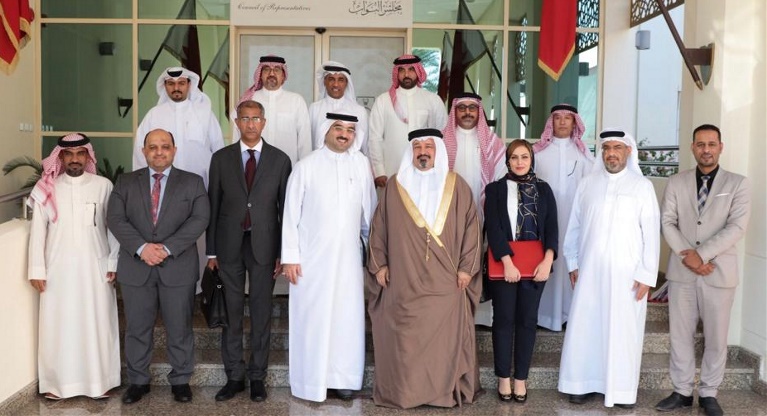
His Excellency Sheikh Ahmed bin Mohammed Al Khalifa, Auditor-General of the National Audit Office (NAO), and his accompanying team attended the Finance and Economic Committee meeting of the House of Representatives at the invitation of Her Excellency, the President of the House of Representatives, Ms. Fawzia Bint Abdullah Zainal, to discuss the observations in the NAO’s report for 2018-2019.
HE the Auditor-General’s acceptance of the invitation comes as part of the cooperation with the legislative authority in line with Article (19), Chapter VI of the NAO’s Law, which states ".... The House of Representatives may invite the President of the Audit Office to attend the sessions in which the House discusses the Audit Office’s report, and shall allow the President to express his views on the matters under discussion, and on the government replies or statements concerning the said matters."
At the outset of the Committee's discussions, HE Sheikh Ahmed bin Mohammed Al Khalifa confirmed that the NAO performs its work as a financially and administratively independent body from the legislative and executive authorities according to Article 116 of the Constitution that states: "A Financial Control Office shall be established by law, and the law shall guarantee its independence. It shall assist the Government and the Chamber of Deputies in controlling the collection of State revenues and the disbursement of its expenditure within the budget limits. The Office shall submit an annual report on its business, with its observations, to both the Government and the Chamber of Deputies.”, and according to Article (1) of the NAO’s Law, stating: "There shall be established in accordance with the provisions of this Law an independent body, having a public legal personality, to be known as the Financial and Administrative National Audit Office “The National Audit Office” and shall be subject to His Majesty the King."
Furthermore, HE the Auditor-General emphasized that the NAO works with the highest standards of integrity, professionalism and transparency in cooperation with the entities subject to its audit to help them improve performance, ensure accountability, enhance transparency and strengthen their internal control systems.
He continued that the NAO’s report has been prepared in cooperation with the audited bodies according to the rules, standards and technical guidelines issued by the International Organization of Supreme Audit Institutions (INTOSAI) and the laws and regulations in force in the Kingdom of Bahrain and includes substantive observations and recommendations based on the audit work completed during the professional year 2018/2019.
During the presentation to the Committee, HE the Auditor-General pointed out that the NAO’s report is issued in several stages according to clear procedures and in cooperation and partnership with the audited entity to ensure the accuracy of the data contained therein: upon completion of the fieldwork, the preliminary results are sent to the concerned authority; then meetings with officials of the concerned authority are held to obtain their views on the NAO’s observations and recommendations; finally the draft report is sent to the concerned Minister or Head of the institution to obtain his / her written response, which is then included in the NAO’s report in accordance with international standards and best practices.
In conclusion, His Excellency stressed that the NAO will continue to help the audited entities strengthen their internal control systems in order to improve their performance, as well as further advance the development of government services and ensure the efficient and effective use of public resources for the benefit of Bahrain’s citizens.
Content last updated: 23 February 2026
Thank you for your opinion!